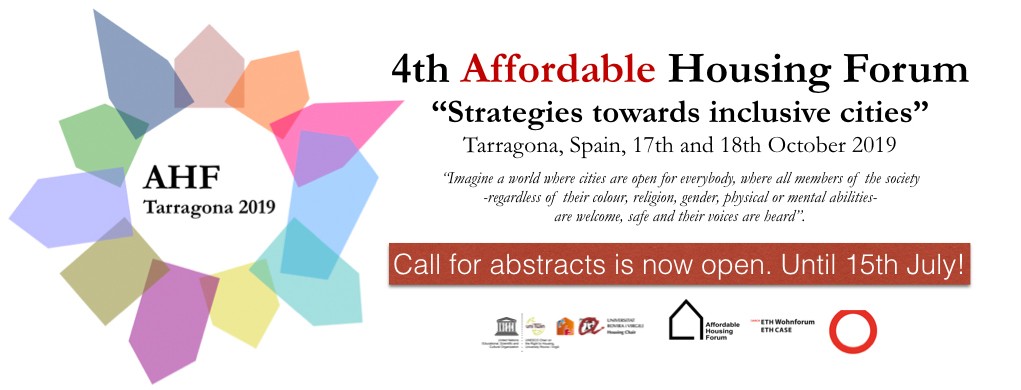
15 July: Call for Papers.
17 and 18 October | Affordable Housing Forum Symposium 2019 in Tarragona, Spain.
The 4th Affordable Housing Forum is an international and interdisciplinary symposium organised by the UNESCO Housing Chair of the University Rovira i Virgili in Tarragona (Spain) and the ETH Wohnforum Centre for Research on Architecture, Society and the Built Environment, Zurich Switzerland.
It aims to bring together junior and senior researchers, educators and practitioners in the field of housing to open the debate and help inspire change. We welcome researchers and practitioners from many fields including urban design and planning, landscape and ecology, geography, social sciences, engineering and other fields related to spatial studies to present their work.
Imagine a world where cities are open for everybody, where all members of the society – regardless of their colour, religion, gender, physical or mental abilities – are welcome, safe and their voices are heard.
In inclusive cities, everybody has access to adequate, safe and affordable housing; to sustainable transport systems; and to safe, inclusive and accessible, green and public spaces. The cities of the future enhance inclusive and sustainable urbanization and capacity for participatory, integrated and sustainable human settlement planning and management. The cities of the future will adopt and implement integrated policies and plans towards inclusion, resource efficiency, mitigation and adaptation to climate change and resilience to disasters. Cities of today are relevant civic formations taking on responsibility – they form platforms of taking action, like e.g. Barcelona, New York or Berlin (text based on the SDG 11, defined by UN).
From the perspectives of urban inclusivity and resilience, the Affordable Housing Forum 2019 in Spain focuses on housing, affordability and inclusion. The AFH 2019 aspires to contribute in defining relevant housing related tools, practices and models that support the sustainable transformation of our cities.
Housing was always far more than a question of just a roof over one’s head. Strictly speaking it is a matter of creating a place where one has a sense of well-being and acceptance and feels at home. Well thought out public and semi-public spaces which invite social interaction are of great importance for the feeling of homeliness. Living together in cities needs also an urban structural planning framework. Just as it is always a question of structure and not only urban design, of urbanity and not only appearance, in housing it is always about everyday integrative suitability for the people.
Whereas the dominant ownership model is in the majority of countries widespread, alternative models of organising and financing housing and inclusion (shared ownership, co-housing, etc.) are still sparsely promoted, nor systematically studied. It is the high interest of the ETH Centre for Research on Architecture, Society & the built Environment and of the UNESCO Housing Chair URV to explore more in the conceptual and practical discussion of housing policies and measures towards inclusion and against segregation, towards organizational as well as social integrative models of affordable housing. They may be historical or contemporary ones, state-subsidized, market-led, or not-for-profit oriented, bottom up or top down models.
Call for Papers, Programme and Read More
Papers are welcome to be presented during the four panels sessions in the symposium and related to their respective topics.
Each presenter should send an abstract of about 350 words by 15th July 2019 (by midnight CET) to the coordinator of the workshop she wants to submit the paper.
Names and e-mail addresses of each coordinator
Panel 01: UN Challenge for inclusive cities – current problems and new approaches for urban inclusivity and housing affordability in Europe. Coordinator: Dr. Héctor Simón-Moreno.
Panel 02: Affordable and inclusive housing best practices in Europe: Coordinator: Núria Lambea.
Panel 03: Inclusive urban design – design approaches and methodologies towards inclusivity and affordability. Coordinator: Gemma Caballé-Fabra.
Panel 04: Digital transformation in housing – its impact on affordability and social connections. Coordinator: Dr. Rosa Maria Garcia-Teruel.
Authors of accepted abstracts will be invited to submit their presentation, poster and/or their full papers of 3,000 words. The submission of full papers is not obligatory. Accepted abstracts can be presented on the symposium in form of a poster or a presentation. Although, we highly recommend the submission of full papers, as the best will be published online. All the accepted abstracts will be published in the symposium Proceedings.